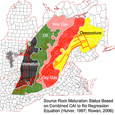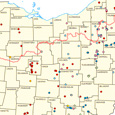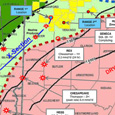Webinar to focus on how dry gas, wet gas production impacts landowners
Thursday, August 14, 2014
UNIVERSITY PARK, Pa. — A Web-based seminar presented by Penn State Extension’s Marcellus Education Team will look at how natural gas processing affects landowner income.
“Natural Gas Processing and Effects on Royalty Income Streams,” begins at 1 p.m. on Thursday, Aug. 21. The one-hour webinar will feature Steven Karabin, president and CEO of the Rhino Group. He will provide an overview of dry and wet natural gas, the byproducts obtained from wet gas, and the natural gas processing operations, as well as address how dry gas and wet gas production affects landowners.
Much has been in the news regarding wet and dry gas, and the need for gas-processing plants to separate components other than methane often found in wet gas. In the webinar, Karabin will discuss the impact on landowner royalty income streams regarding dry gas versus wet gas production and he will cover the differences in dry gas versus wet gas decline curves.
Karabin, who has a degree in petroleum and natural gas engineering, has worked as a drilling and reservoir engineer for various gas companies. A registered landman, he has more than 25 years of technical, business and financial experience to draw on in helping landowners maximize returns and minimize risk.
“To date, more than $9 billion has been spent in the region to build natural gas processing plants,” he said. “Industry leaders believe at least that much needs to be spent in the coming years to process all the natural gas and natural gas liquids that are being and will be produced.”
Knowing the impacts of natural gas processing on royalty payments is a must for landowners, Karabin pointed out.
Penn State Extension’s Marcellus Education Team provides at least monthly webinars on a variety of topics. Upcoming webinars include the following:
–Sept 18: Topic to be announced.
–Oct. 16: “The Bakken Part 1: History and Challenges of Current Oil and Gas Development,” Vicky Steiner, executive director, ND Association of Oil & Gas Producing Counties, and Gerry Fisher, administrator, ND Energy Infrastructure and Impact Office.
–Nov 20: “The Bakken Part 2: Responding to the Challenges and Planning for the Future,” Deb Nelson, program manager, Vision West ND, and Daryl Dukart, Chairman, Vision West ND Consortium.
The webinars are free, but participants must register on the events page of the Penn State Extension Natural Gas website at http://extension.psu.edu/
Previous webinars, publications and information also are available on the Penn State Extension natural-gas website (http://extension.psu.edu/
For more information, contact Carol Loveland at 570-320-4429 or by email at cal24@psu.edu.




